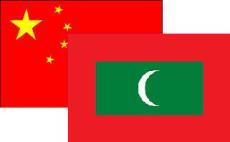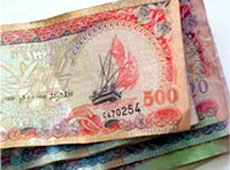The Maldives Police Service (MPS) has begun sending large numbers of police officers to the islands in preparation for the upcoming presidential election.
The MPS launched ‘Operation Blue Waves’ at 6:00pm on August 15 and will continue it “until voting ends and the elected president is officially sworn in”. The stated objective of the operation is “making the presidential elections proceed peacefully”.
The second-ever democratic presidential election in the Maldives is scheduled for September 7, while the second-round runoff will take place (if necessary) October 28, followed by the newly elected president taking the oath of office November 11.
‘Operation Blue Waves’ priorities include “stopping campaign members from breaking any campaign laws as well as stopping any incident that may occur”.
The MPS has stated that a large number of police officers from Male’ and the atolls are participating in the operation.
While normal patrolling will continue in Male’, additional police officers will also be deployed under ‘Operation Blue Waves’ to “maintain peace” by patrolling the capital in two shifts.
The MPS has begun sending officers to the islands Saturday (August 17), with police teams sent to most central and southern atolls, including Faafu, Dhaalu, Meemu, Thaa, Laamu, and Huvadhoo Atolls, as well as Fuvahmulah and Addu City.
Additionally, police officers who have recently completed the Police Recruitment Training Course on Vaanee in Dhaalu Atoll, are to be deployed in the atolls north of Male’.
Meanwhile, police are to be deployed from Male’ to the northern atolls today (August 18).
Prior to launching ‘Operation Blue Waves’ the police had several discussion meetings with the Elections Commission (EC) regarding the “assistance police can offer”, Police Spokesperson Chief Inspector Hassan Haneef told Minivan News Thursday (August 15).
Haneef explained the proposed MPS elections assistance included: providing security for EC heads and officials, election offices, candidates and their running mates; stationing police officers on every inhabited island; making voting arrangements for incarcerated individuals; curbing criminal offenses; and establishing protocols for incidents that might occur during elections.
The MPS plans to maintain peaceful law and order and public safety during the election by “increasing the visibility of police actions during elections, as per the rules regarding the presidential election”, said Haneef.
There will be a “police presence on every island where vote boxes are to be kept”, he noted.
“Police teams will be stationed 100 feet away from the ballot boxes in normal situations,” Haneef continued. Officers will also “attend criminal offences whether they occur at the vote centre, or otherwise”.
Police have been trained for “various possible scenarios” and “units to act during emergency situations will be kept on alert,” he explained.
“[Additionally,] discussions have been held between the MPS and Maldives National Defence Force (MNDF) to establish protocols for joint operations to bring back order,” Haneef added.
Elections Commission regulations
Currently the EC is drafting a document to articulate what the MPS’ mandate will be during the September 7 presidential elections, which is to be made public this week.
EC President Fuwad Thowfeek outlined some of the key regulations related to concerns regarding police interference with elections while speaking with Minivan News in July.
“Police cannot stand within a 100 foot radius of the ballot box,” Thowfeek confirmed.
“Police can enter the area only if the Head of Polling Station requests their assistance to control any criminal activity that goes beyond his control,” he continued.
“The role of the police will be to assist the Elections Commission in keeping peace and public safety,” he added.
Last week, EC Vice President Ahmed Fayaz further explained to Minivan News that while the commission has requested the MPS play a supporting role to help ensure peaceful, free and fair elections take place, police officers cannot intervene without a specific EC request.
“Police can intervene only at the request of the Elections Commission staff,” said Fayaz.
“The police are playing a support role and support will be requested [by EC officials] in case anything happens that would prevent a smooth election,” he continued.
“We have requested police provide assistance on every single island that will have ballot boxes,” he added.
The MPS mandate regarding elections is limited to enforcing law and order and monitoring the situation on each island, Fayaz noted.
MPS manipulating election: MDP
Meanwhile, the Maldivian Democratic Party (MDP) has continued to accuse both the government and senior police officials of trying to undermine free and fair elections, alleging the institution was actively seeking lists detailing the country’s deceased in an attempts to try and rig voting.
Earlier this month, MDP MP and Spokesperson Hamid Abdul Ghafoor claimed that concerns about police trying to seek the details of deceased nationals reflected the party’s wider suspicions that senior figures in the MPS were trying to use their influence to manipulate the election.
Ghafoor said one key concern had been an announcement back in June that staff at the Department of National Registration were refusing to continue issuing national identity cards 94 days before elections, complaining of a malfunctioning air conditioning unit.
Yesterday (August 17) the EC revealed that 38 people’s names have been fraudulently re-registered to vote outside of their home towns in next month’s presidential poll.
However, earlier this month the EC rejected any possibility that the identities of deceased citizens could be used to fraudulently vote in the upcoming election.
Former President Mohamed Nasheed also emphasised his concerns about police influencing September’s presidential election results while speaking at an MDP campaign rally in July.
“According to information I am getting, [Police Commissioner] Abdulla Riyaz is instructing police officers to barge into polling stations upon his signal, after two individuals enter and create a scene,” Nasheed declared.
The second method by which the police will attempt to ruin the elections is intervening during the vote counting process, after claiming that difficulties are being experienced, such as the election being “rigged”, Nasheed alleged.
The MDP maintains that its presidential candidate Mohamed Nasheed resigned on February 7, 2012 in a coup d’etat instigated by mutinying police officers of the Special Operations (SO) command.
 In September 2012, President Waheed told
In September 2012, President Waheed told  electricity and phone bills if funds were not transferred from the MVR 1.8 billion (US$117 million) Public Sector Investment Programme (PSIP).
electricity and phone bills if funds were not transferred from the MVR 1.8 billion (US$117 million) Public Sector Investment Programme (PSIP). “I’m not sure if there will be a ballot box on the resort. We have not been informed by the resort management,” said a water sports instructor working on a resort near Male’.
“I’m not sure if there will be a ballot box on the resort. We have not been informed by the resort management,” said a water sports instructor working on a resort near Male’.